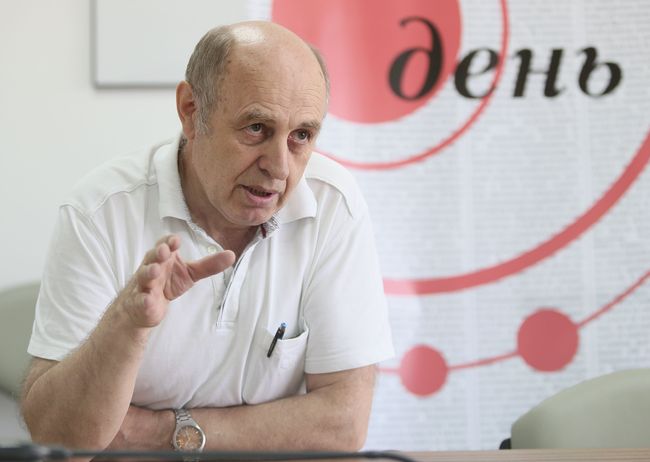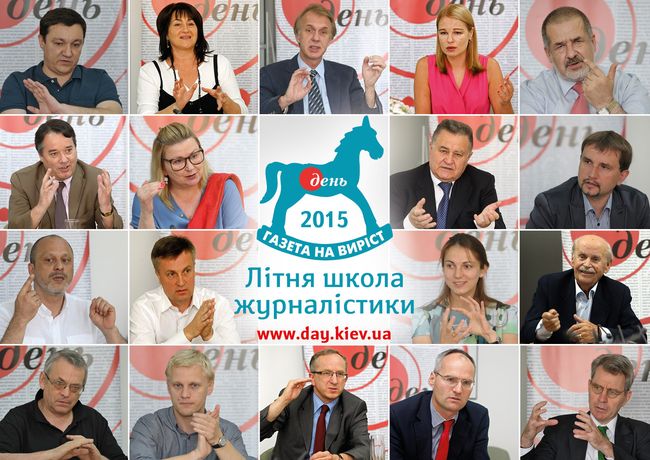How to “present” history
Volodymyr SERHIICHUK: “TV programs should be based on the personal memory of Ukrainians”
Doctor of History Volodymyr Serhiichuk, a professor at the National Taras Shevchenko University of Kyiv (KNU), a Den contributor, has been teaching the history of Ukraine for a quarter of a century to students of the university’s Institute of Journalism. The academic is strongly convinced that Ukrainian quality journalism cannot exist without those who know history. Therefore, Mr. Serhiichuk bitterly resented the fact that history would not be taught at some universities, including their journalism faculties, in the new academic year (for details see the article “History off Curriculum,” The Day, No. 38, June 18, 2015). Why should no other than journalists know history very well? What stages of it should be studied first of all? Can history be a top-rated TV program? It is these and other questions that The Day discussed with Volodymyr SERHIICHUK.
“It is a call of the times for the present-day media to reappraise history,” Mr. Serhiichuk reasons, “but this should be done seriously, in a good style, with a right emphasis, and by means of the intellectual resources of Ukrainian national journalism. When a person of non-Ukrainian origin makes a program on the history of Ukraine, it is immediately clear that he or she is indifferent about what is being shown. This kind of journalist never takes a patriotic view of history. For this reason I wish there were more Ukrainian journalists on Ukrainian TV screens. This presents a problem today.
“Having been in touch with TV channel owners in the past 20 years, I must say that, instead of training their own presenters, they invite some from other countries, particularly Russia. You know, the situation that has existed in the media in all these years can be compared today with politics – foreigners are being invited en mass to the government. They are more or less known and have managed to achieve some successes… But do we not have skilled personnel of our own? How can a stranger work for the benefit of the Ukrainian state if he or she came here just to earn money?
“For me, the author of the book What Ukraine Gave to the World which gives the first-ever full account of the contribution of outstanding Ukrainians to the development of world science, technology, education, and culture, it sounds outrageous that we have allegedly failed to find our own professionals. There were Ukrainians who served as US presidents’ aides, governor-general of Canada, and prime minister of France, but what about a region in the Ukrainian state? On the one hand, I congratulate my former student Mikheil Saakashvili on being appointed as chairman of the Odesa Oblast State Administration. I taught him, and I know that he was a good student who was bursting to speak at every seminar. After all, he really carried out a lot of positive reforms in Georgia. But will we be able to find a foreigner for every region?
“Incidentally, Russia once decided to embark on a course of reforms at the expense of Germans. And what was the result?
“It is a different story when experienced representatives of the Ukrainian diaspora are invited to help our state – it is their duty to take part in this because their parents, who had managed to break free from the ‘communist paradise,’ dreamed for dozens of years about the renaissance of an independent Ukrainian state.”
Historical programs on Ukrainian TV are usually linked to certain dates. There are very few separate projects: “Time Machine” on the 5th Channel, “Historical Truth” on ZIK… Can history be top-rated?
“History can be top-rated if it is shown as topical. Besides, these programs should embrace a broader circle of the interested people, not only the elites. In other words, the life of an ordinary Ukrainian and his family must be shown through a historical prism. For example, the viewer will watch a program about the repressed and unjustly convicted if his family was also once in a similar situation. This means that programs should be based on the personal memory of Ukrainians. Take, for example, the liberation movement: Bandera is always in the limelight, but why not study and show on TV screen the life of a rank-and-file underground fighter or a concrete villager? It is still not too late to do so, although very much time has been lost.”
Do you think the situation on Ukrainian TV has been changing after the Maidan 2014?
“After the Revolution of Dignity, the situation is changing, albeit with difficulty. New interesting programs are coming up, particularly on the 1+1. But it is still not the TV footage that society needs. I will say again that we must give our own journalists a chance today. In the 25 years of my teaching the history of Ukraine at Taras Shevchenko University’s Institute of Journalism I have noticed very many original students who evinced sincere interest in and were thirsty for knowledge. Where are they now? They should have been supported in good time and given a chance to realize themselves.
“It is Den’s Summer School of Journalism that can give this chance, for it adds very much to theoretical studies and teaches the rules of social behavior.”
How do you explain to your students, particularly the would-be journalists, that they must know history from a professional viewpoint?
“I emphasize that they need this to be better aware of themselves and the country they live in. Now that our neighbors are alleging for the whole world to hear that Ukraine has not succeeded as a state, it is Ukrainian journalists who should spread the truth about our past and, hence, they should know, above all, the periods when Ukrainian statehood was in the making. Besides, some ‘old’ issues are topical again today, such as the so-called eternal friendship and fraternity with the Russians. We are no brothers at all, which the present day confirms. We have never had a common ‘cradle.’”

How do you manage to get the young people interested?
“Everybody has methods of their own. To encourage my students, I advise them to write and publish history-related articles instead of writing book reports. I say to them: if you get your study printed in a local or national newspaper or on an interesting website, I will give you a 10-point grade. So, the students find some interesting information, reconsider it through their own mental prism, and thus spread this knowledge.
“I know that some students have even started a website to further spread their texts. I have checked the frequency of clicks – hundreds of people read these texts. They broach important topics about the Ukrainian context of World War Two, the problems of contemporary history, etc.
“I also give a concrete student a new history-related book and ask him or her to write a review of it. Or I invite a well-known person, and student journalists communicate with him or her during a class and then write a report on this ‘historic’ event. Can you fancy, for example, how emotional were the reports about a meeting with [poet] Dmytro Pavlychko? Some students even wrote these reports in verse.
“Therefore, we must look for the interesting ways of working with students. Incidentally, one of them is to draw up a family tree with commentaries. In other words, I give students an assignment to study their genealogy in spare time. If you could only see what huge posters with the portraits and biographies of their lineage they bring over!
“By doing so, students not only take interest in their family line, but also attract their relatives to this, and the latter also come to know about their ancestors – so the circle of those interested in their past is widening. And the knowledge of your family line arouses interest in the history of Ukraine, your native land. And this is no less important than writing an essay on a certain given theme.”
Newspaper output №:
№39, (2015)Section
Society





